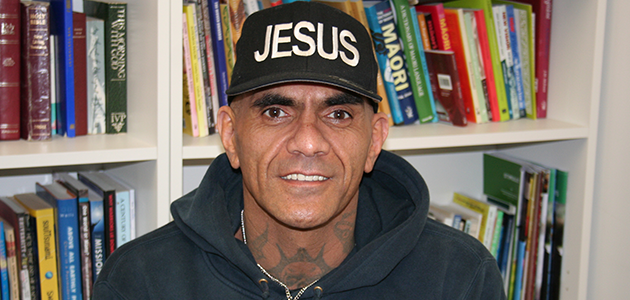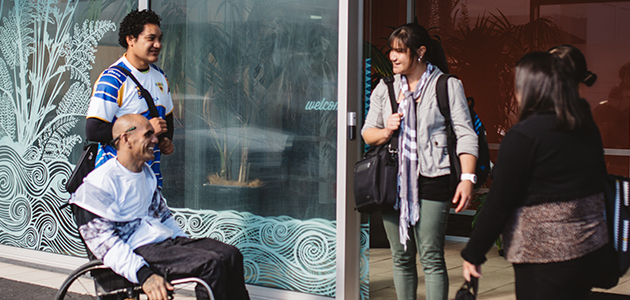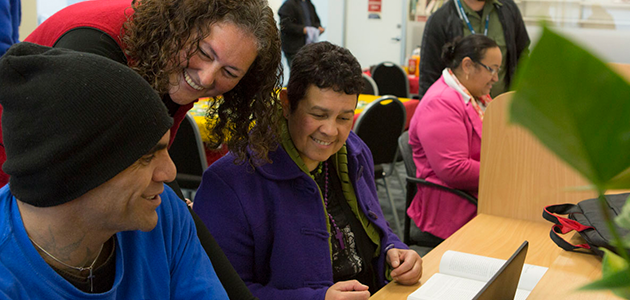19 December 2016
A Restored Life
Laidlaw student Bob Reynolds marvels at the grace of God as he reflects on his life’s journey thus far. For Bob, the movie Once Were Warriors was a real-life experience. His Niuean mother was the black sheep of the family because she had a relationship with a Maori and had Bob out of wedlock. Beaten and kicked out of home by her ashamed father, Bob and his sister were left in their grandparents’ care. His father took off to Australia to avoid maintenance payments. Bob was seen as the rebel child and passed around relatives, always ending up back at his grandparents’ home.
His mother and new step-father came to collect him and his sister when Bob was 7. Their Housing NZ house was a drinking pad and frequently visited by gang members. Clinking noises late at night signalled party night. His younger siblings (and now step-siblings) would huddle in bed crying, as Bob did his best to protect them from the violence. At one point he intervened when his mother and step-father were fighting, grabbing a knife and stabbing his step-dad in the leg. The knife bent, Bob was grabbed by his throat and only an aunty’s well-aimed kick to his step-father’s groin prevented serious injury to Bob.
At age 10 Bob started experimenting with alcohol, drinking from bottles left behind at parties. He started glue and petrol sniffing, hanging around the Otara shopping centre with the street kids. He became a street kid himself and by age 12 had his own street gang. They would meet other gangs in parks and fight, one-on-one. Bob started experimenting with marijuana and pills and got involved in burglaries and stealing cars. He was a frequent attender at the Youth Court, with a social worker telling him, “You might as well move in”. At 14 he was placed in the Owairaka Boys’ Home but ended up running away. Only the pleas of his mother prevented his return.

At 16, Bob was in Mt Eden prison, awaiting sentence for aggravated robbery. A street-wise uncle advised him to plead alcohol and drug addiction to avoid jail. He duly did and was sent to Odyssey House, a residential treatment centre. With no desire to change Bob faked his way through the four levels of the programme. Months before the two-year programme finished, Bob ran away. He should have been recalled to prison but for some reason that breach was never reported to the Police. The cycle of drug taking, violence and crime worsened, with Bob in and out of prison.
By age 23 Bob was the father of four, the mother of his children a girl he had met as a young street kid. He had been out of jail for three months when the father he hadn’t seen for 15 years came to visit. Bob hated his father for deserting him as a young child, and it was with thoughts of killing him that he asked, “Dad, I want to change my life. Can I come over and work with you?” His dad agreed and paid his fare. The first week in Australia Bob and his dad drove from South Australia to Perth, and the hate started to lessen as they spent time together.
Although life in Australia offered a fresh start, Bob hadn’t gone to change. He made $2,000 a fortnight at his new spray painting job, but his pay would only last two or three days as it all went on drugs and beer. The drinking got too much for his father and he ended up firing him. Bob begged for his job back. Twice his dad gave in but the third time he had had enough and left Bob. Unbeknown to his dad, Bob’s issue wasn’t only alcohol – he was taking cocktails of speed and amphetamine and staying up all night, clubbing and committing burglaries. He gained a reputation for violence, beating up people as a way of gaining respect.
Warrants for his arrest throughout South Australia prompted a move to Alice Springs and a job drilling for gold. The drug use and crime continued and Bob moved on to Dongara, Western Australia. He had a relationship with a woman there and got a job drilling for oil out in the desert. A month before his 30th birthday, Bob drove the 36 km journey into town to go drinking. Travelling home he crashed into a bridge and was paralysed from the waist down. Six weeks later his son was born.
After the accident Bob’s life spiralled downhill. He told his company he had been driving into town to collect supplies and received a $56,000 accident pay-out. The money lasted five months as Bob spent it on the high life, and funding a heroin business. His partner left him, unable to handle his drug-crazed violence and the wheelchair. Moving his heroin business to Perth, Bob employed a driver, a righthand man and delivery people. He soon had undercover Police tailing him, trying to discover the big players. Finally arrested and then bailed, Bob skipped town and caught a train to Sydney. He initially stayed with his sister until she kicked him out for using. Lying to the Australian Housing authorities about being forced to sleep at the beach, he was given motel accommodation and then his own modified place.
He went to church in Sydney. Not for any desire to have a relationship with Jesus. He wanted to maintain a relationship with a Christian doctor whom Bob convinced to prescribe him morphine pills. Bob would crush the pills and then shoot them up. He even got baptised, but the next day scored some heroin and had no more need of the doctor or church.

An arrest for burglary saw the full weight of the law catch up with Bob. Declared a menace to Australian society he was deported back to New Zealand. Within a month he was using again, and then selling drugs from his modified Housing NZ unit. There were a lot of parties, violence and the crime continued. He was a master at lies and using his disability as an excuse to escape jail.
Bob attempted suicide a number of times. He was convinced he would either die by overdosing or ‘death by cop’. His last attempt at suicide saw him ingest 900 pills and on life support. The doctor told his family he would be a vegetable if he survived. The decision made to turn off the machine, his mother came in to say goodbye. As she walked in, “I opened my eyes, pointed at her and said, ‘Why am I still here?’”. After that, he gave up trying to kill himself.
The arrival of a new disability helper, Raki, was a turning point. Raki told him he was a Christian and Bob replied, “Yeah, God sent you”. Deep down he was tired and crying out for God. Raki’s constant talk about God was an annoyance to Bob, and his daily presence irritated Bob’s mates who couldn’t do drugs in front of him. They were keen to beat him up but Bob would protect him, even though he didn’t like him. Unbeknown to Bob, Raki had asked his Life Group to pray for Bob and it was to that group that Bob eventually went. The Life Group was part of Victory Outreach Church, a church with a particular ministry to addicts. A member of the Life Group invited Bob to Promise Keepers. He responded to an altar call there, though continued to take drugs. Two weeks later on 14 October 2012 God spoke directly to Bob at church. One of the pastors said, “God gave me a message last night. I don’t know who it’s for or what you’ve done, but whatever it is God has got big plans for your life”. He went on to say that in order for the person to move forward they must burn their plows. As he shared the message Bob started getting warm. He took his top off. It was like an electric jolt shooting through his body. “I was actually rushing, but it was the best rush I ever had”. Bob went home, and with Raki’s help, smashed over 100 needles and all the drug paraphernalia in the house.
The next day he woke up, surprised there were no drug cravings. That convinced Bob that God was real. He told everyone what had happened but was met with scepticism. “Bob can’t change, he’s up to something”. A year and a half later, family and friends started realising the change was for real. Bob was looking better. Phones and wallets were left out when he went to visit family.
Bob heard about the opening of Laidlaw’s Manukau campus through his Christian support worker. Keen to learn more about God, he applied but then struck a hurdle. StudyLink refused to grant a loan as he was a declared bankrupt. A few days later Bob got a call to say some Laidlaw supporters had given money to support a student with a disability. That provision from God has continued throughout his studies. His Christian doctor put money towards his fees. Church friends and family have fundraised for him.
The next hurdle was study. His education had been so interrupted he had no idea what a full stop or comma was, let alone an essay. His first assignment was submitted five times before it passed with a B+. He’s since passed every paper and is deeply grateful to tutors who have helped him to the point where he has now graduated with a Certificate in Christian Studies.
Bob’s dream is be a counsellor for troubled youth. He’s currently doing a course with Youthline and intends to be back at Laidlaw next year doing Diploma studies, en route to a Bachelor in Counselling. Once a month Bob is down in Queen Street with a couple of Christian friends, handing out blankets and food to the homeless. Initially suspicious of his motives, there are now smiles and waves as the group arrive.
Bob is clear that his life isn’t a waste. “God is good. He has delivered and restored me and I just love him!”
